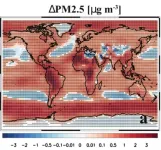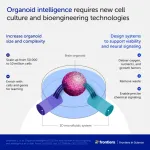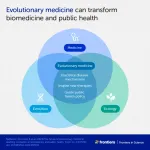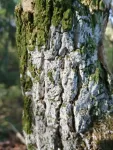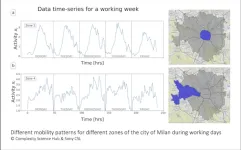(Press-News.org) Not all pollution comes from people. When global temperatures increase by 4 degrees Celsius, harmful plant emissions and dust will also increase by as much as 14 percent, according to new UC Riverside research.
The research does not account for a simultaneous increase in human-made sources of air pollution, which has already been predicted by other studies.
“We are not looking at human emissions of air pollution, because we can change what we emit,” said James Gomez, UCR doctoral student and lead author of the study. “We can switch to electric cars. But that may not change air pollution from plants or dust.”
Details of the degradation in future air quality from these natural sources have now been published in the journal Communications Earth & Environment. About two-thirds of the future pollution is predicted to come from plants.
All plants produce chemicals called biogenic volatile organic compounds, or BVOCs. “The smell of a just-mowed lawn, or the sweetness of a ripe strawberry, those are BVOCs. Plants are constantly emitting them,” Gomez said.
On their own, BVOCs are benign. However, once they react with oxygen, they produce organic aerosols. As they’re inhaled, these aerosols can cause infant mortality and childhood asthma, as well as heart disease and lung cancer in adults.
There are two reasons plants increase BVOC production: increases in atmospheric carbon dioxide and increases in temperatures. Both of these factors are projected to continue increasing.
To be clear, growing plants is a net positive for the environment. They reduce the amount of carbon dioxide in the atmosphere, which helps control global warming. BVOCs from small gardens will not harm people.
“Your lawn, for example, won’t produce enough BVOCs to make you sick,” Gomez explained. “It’s the large-scale increase in carbon dioxide that contributes to the biosphere increasing BVOCs, and then organic aerosols.”
The second-largest contributor to future air pollution is likely to be dust from the Saharan desert. “In our models, an increase in winds is projected to loft more dust into the atmosphere,” said Robert Allen, associate professor of Earth and Planetary Sciences at UCR and co-author of the study.
As the climate warms, increased Saharan dust is likely to get blown around the globe, with higher levels of dust in Africa, the eastern U.S., and the Caribbean. Dust over Northern Africa, including the Sahel and the Sahara, is likely to increase due to more intense West African monsoons.
Both organic aerosols and dust, as well as sea salt, black carbon, and sulfate, fall into a category of airborne pollutants known as PM2.5, because they have a diameter of 2.5 micrometers or less. The increase in naturally sourced PM2.5 pollution increased, in this study, in direct proportion to CO2 levels.
“The more we increase CO2, the more PM2.5 we see being put into the atmosphere, and the inverse is also true. The more we reduce, the better the air quality gets,” Gomez said.
For example, if the climate warms only 2 degrees Celsius, the study found only a 7% increase in PM2.5. All of these results only apply to changes found in air quality over land, as the study is focused on human health impacts.
The researchers hope the potential to improve air quality will inspire swift and decisive action to decrease CO2 emissions. Without it, temperatures may increase 4 degrees C by the end of this century, though it’s possible for the increase to happen sooner.
Gomez warns that CO2 emissions will have to decrease sharply to have a positive effect on future air quality.
“The results of this experiment may even be a bit conservative because we did not include climate-dependent changes in wildfire emissions as a factor,” Gomez said. “In the future, make sure you get an air purifier.”
END
Breathing is going to get tougher
Hotter temps = more air pollution from natural sources
2023-02-28
ELSE PRESS RELEASES FROM THIS DATE:
Scientists unveil plan to create biocomputers powered by human brain cells
2023-02-28
Artificial intelligence (AI) has long been inspired by the human brain. This approach proved highly successful: AI boasts impressive achievements – from diagnosing medical conditions to composing poetry. Still, the original model continues to outperform machines in many ways. This is why, for example, we can ‘prove our humanity’ with trivial image tests online. What if instead of trying to make AI more brain-like, we went straight to the source?
Scientists across multiple disciplines ...
From anti-antibiotics to extinction therapy: how evolutionary thinking can transform medicine
2023-02-28
The word ‘evolution’ may bring to mind dusty dinosaur bones, but it impacts our health every day. For example, even though antibiotics were invented only a century ago, the evolution of antibiotic resistance is already a major concern. The rise in modern health problems such as obesity can also be traced back to evolutionary principles.
An article published in Frontiers in Science demonstrates how applying an evolutionary perspective to medicine can inspire new ways of preventing and treating disease.
“Evolutionary medicine holds promise to transform our understanding of why we get sick ...
Researchers from the Institute of Botany discovered a new type of coexistence between algae and fungi
2023-02-28
Researchers from the Institute of Botany, Czech Academy of Sciences, described the symbiotic relationship between fungi and algae which science has largely overlooked until now. The coexistence of algae and corticioid basidiomycetes, which are common in temperate forests, has been given a new name: alcobiosis.
Jan Vondrák of the Department of Taxonomy, Institute of Botany, and the first author of the study says “Years ago, during field trips, we were repeatedly puzzled to find a layer of green algae where some of the fungal coatings on wood or bark (so-called corticioid fungi) are disturbed. We discovered that this is a ...
The largest genomic study of rare cancer metastathic pheochromocytoma identifies patients at highest risk of metastasis and those who would respond to immunotherapy
2023-02-28
The new results will help to follow patients with a bad prognosis more closely, and to move towards more personalized treatments.
Mercedes Robledo, co-lead author, has been studying pheochromocytomas since 1996 and leads the CNIO group that has identified 5 of the 22 genes associated with these rare tumors.
The research analyzes an "exceptionally high" number of samples, something very difficult in rare diseases and achieved thanks to the collaboration of centers from countries all over the world.
Pheochromocytoma is a rare tumor, with an ...
How to predict city traffic
2023-02-28
A new machine learning model can predict traffic activity in different zones of cities. To do so, a Complexity Science Hub researcher used data from a main car-sharing company in Italy as a proxy for overall city traffic. Understanding how different urban zones interact can help avoid traffic jams, for example, and enable targeted responses of policy makers - such as local expansion of public transportation.
Understanding people's mobility patterns will be central to improving urban traffic flow. “As populations grow in urban areas, this knowledge can help policymakers design and implement effective transportation ...
Parental support for LGBTQ youth is important, research shows
2023-02-28
Depression is more widespread among lesbian, gay, bisexual, transgender, or questioning (LGBTQ) youth than heterosexual, cisgender youth, making parental support more important for these adolescents. A new study released in Child Development by researchers at The University of Texas at Austin looks at parental social support and psychological control in relation to depressive symptoms for LGBTQ youth in the United States. Psychological control attempts to intrude into the psychological and emotional development of the child (e.g., thinking processes, self-expression, emotions, and attachment to parents). Although ...
SUTD to launch south-east Asia’s first O-RAN Open Testing and Integration Centre (OTIC)
2023-02-28
SUTD to Launch South-east Asia’s First O-RAN Open Testing and Integration Centre (OTIC)
Announced at the Mobile World Congress Barcelona (MWC) 2023, Singapore University of Technology and Design (SUTD) will launch a new O-RAN[1] Asia & Pacific Open Testing and Integration Centre (OTIC) in Singapore. As part of Singapore’s S$70 million Future Communications R&D Programme (FCP) supported by Singapore’s Infocomm Media Development Authority (IMDA) and the National Research Foundation, Singapore (NRF), the Asia & Pacific OTIC in Singapore ...
12 exotic bacteria found to passively collect rare earth elements from wastewater
2023-02-28
Rare earth elements (REEs) are a group of 17 chemically similar metals, which got their name because they typically occur at low concentrations (between 0.5 and 67 parts per million) within the Earth’s crust. Because they are indispensable in modern technology such as light emitting diodes, mobile phones, electromotors, wind turbines, hard disks, cameras, magnets, and low-energy lightbulbs, the demand for them has increased steadily over the past few decades, and is predicted to rise further by 2030.
As ...
Will future computers run on human brain cells?
2023-02-28
A “biocomputer” powered by human brain cells could be developed within our lifetime, according to Johns Hopkins University researchers who expect such technology to exponentially expand the capabilities of modern computing and create novel fields of study.
The team outlines their plan for “organoid intelligence” today in the journal Frontiers in Science.
“Computing and artificial intelligence have been driving the technology revolution but they are reaching a ceiling,” said Thomas Hartung, a professor of environmental health sciences at ...
Study reveals improvements in workplace support and leadership training will improve the mental health and potentially reduce burnout in healthcare professionals
2023-02-28
Amongst healthcare professionals, the feeling of being supported in the workplace can protect them against adverse mental health and burnout, according to a new study published in CMAJ Open by researchers at Queen Mary University of London and medical staff at various hospitals across the UK.
CoPE-HCP study was designed, during the early part of COVID-19 pandemic, when there was great concern for the mental health of healthcare professionals with no scientifically-proven mitigating strategies to reduce that impact. Funded by Barts Charity, this new longitudinal study found that feeling unsupported ...
LAST 30 PRESS RELEASES:
6 in 10 US women projected to have at least one type of cardiovascular disease by 2050
People’s gut bacteria worse in areas with higher social deprivation
Unique analysis shows air-con heat relief significantly worsens climate change
Keto diet may restore exercise benefits in people with high blood sugar
Manchester researchers challenge misleading language around plastic waste solutions
Vessel traffic alters behavior, stress and population trends of marine megafauna
Your car’s tire sensors could be used to track you
Research confirms that ocean warming causes an annual decline in fish biomass of up to 19.8%
Local water supply crucial to success of hydrogen initiative in Europe
New blood test score detects hidden alcohol-related liver disease
High risk of readmission and death among heart failure patients
Code for Earth launches 2026 climate and weather data challenges
Three women named Britain’s Brightest Young Scientists, each winning ‘unrestricted’ £100,000 Blavatnik Awards prize
Have abortion-related laws affected broader access to maternal health care?
Do muscles remember being weak?
Do certain circulating small non-coding RNAs affect longevity?
How well are international guidelines followed for certain medications for high-risk pregnancies?
New blood test signals who is most likely to live longer, study finds
Global gaps in use of two life-saving antenatal treatments for premature babies, reveals worldwide analysis
Bug beats: caterpillars use complex rhythms to communicate with ants
High-risk patients account for 80% of post-surgery deaths
Celebrity dolphin of Venice doesn’t need special protection – except from humans
Tulane study reveals key differences in long-term brain effects of COVID-19 and flu
The long standing commercialization challenge of lithium batteries, often called the dream battery, has been solved.
New method to remove toxic PFAS chemicals from water
The nanozymes hypothesis of the origin of life (on Earth) proposed
Microalgae-derived biochar enables fast, low-cost detection of hydrogen peroxide
Researchers highlight promise of biochar composites for sustainable 3D printing
Machine learning helps design low-cost biochar to fight phosphorus pollution in lakes
Urine tests confirm alcohol consumption in wild African chimpanzees
[Press-News.org] Breathing is going to get tougherHotter temps = more air pollution from natural sources
